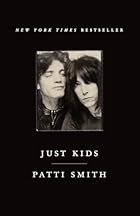 I looked at the synopsis for this one when it won the National Book Award and found I just wasn't all that interested in it. I didn't recognize Patti Smith's name at all and the only thing I knew about Robert Mapplethorpe was a vague recollection of the major bruhaha over his homoerotic photographs way back when I was in high school. Not exactly the sort of "oh wow, I'd love to read about these people and their friendship" that might have driven me to get the book. And then my bookclub decided to read it, so despite my continuing disinterest, I was going to read it too. Unfortunately it didn't exceed my expectations although inexplicably most of my bookclub liked it a lot better than I did.
I looked at the synopsis for this one when it won the National Book Award and found I just wasn't all that interested in it. I didn't recognize Patti Smith's name at all and the only thing I knew about Robert Mapplethorpe was a vague recollection of the major bruhaha over his homoerotic photographs way back when I was in high school. Not exactly the sort of "oh wow, I'd love to read about these people and their friendship" that might have driven me to get the book. And then my bookclub decided to read it, so despite my continuing disinterest, I was going to read it too. Unfortunately it didn't exceed my expectations although inexplicably most of my bookclub liked it a lot better than I did.Starting with her own childhood and teen years, Smith contrasted her own family and upbringing before moving to New York City with Mapplethorpe's similar family background. Quickly shedding the constrained and pre-determined life she'd face if she stayed in the suburbs, Smith moved to New York City, stumbling into the arty bohemian culture that would prove to be her lifeblood and which would lead her to Mapplethorpe, her best friend and long time love. They sort of fall into a relationship as lovers and enthusiastic supporters of each others' varied artistic endeavors; sharing cheap apartments, studios and, for a time, the storied Chelsea Hotel; starving together when they can't afford food; nursing each other through illness; and encouraging each other to break into the music and art circles that could make a difference to their future successes. As Smith and Mapplethorpe try to find themselves and the artistic mediums in which they want to showcase their messages, they wend their way through the riotous world of the late 60's and early 70's in New York. From desperate young lovers to dearest platonic friends and eventually through Robert's terrible, early death from AIDS, Smith has written a tepid love-letter to a man forever in her heart.
Although her relationship with Mapplethorpe must have been very complex and multi-faceted, Smith has not managed to convey a real sense of depth to what should be the main focus of the book. She herself comes off as naive and boring while Mapplethorpe comes off as a social climbing, egomaniacal user. But her lack of insight into herself and Mapplethorpe is only one of the problems with the book. Set in a vibrant and unique time and place, Smith doesn't manage to evoke that time and place very well at all. She focuses on heavy descriptions of the apartments they lived in and the clothes they wore but manages to miss conveying the overarching sensibility of the time, presenting little actual substance about the people and artists inhabiting this world and even less about herself and Mapplethorpe. Great writing, as opposed to the self-conscious and forced attempt at poetic writing found here, would have been able to bring me into the scene despite my own safe, suburban life and yet this was so pedestrian that I never felt as if I was there.
Despite the great love Smith harboured for Mapplethorpe, there was a detachment that belied the depth of feeling she tells us over and over was the centerpiece of their relationship. The middle portion of the book was a list of the famous and not so famous people that she and Mapplethorpe encountered as they practiced their art and searched for a way into the inner circle of folks like Warhol. This name dropping was not only dull but ineffective, making the reader care not at all for the brief scenes invoked only to mention the names (many of which this reader didn't recognize nor have any interest in looking up). And really, there were very little scenes of any substance at all with more of the book feeling like blurry snapshots where any and all action happened just outside the frame of the picture. As one of the few sober people on the scene, Smith's memories, aside from the apartments, studios, and clothing are less vivid and interesting than one might hope causing the reader to wonder what experiences she is glossing over. The narration is pretentious and filled with studied offhand references to French poets Baudelaire, Rimbaud and Genet but little to no information on her own career and eventual success or Mapplethorpe's either. Apparently the struggle was all. But it wasn't. Frankly for me, the struggle to read and finish it was all. Deeply disappointing, that this very uninspired, uninteresting memoir won the National Book Award and continues to garner highly laudatory responses is completely baffling to me.




I've been disappointed by a couple of National Book Award winners recently too. I'm thinking it's gong to take a bit to get me to read another one anytime soon.
ReplyDeleteYou know I liked this book more than you (although I agree on many points, such as the name-dropping and distance), but I agree that often award-winners are baffling. I never rely on that alone to recommend a book for me.
ReplyDelete